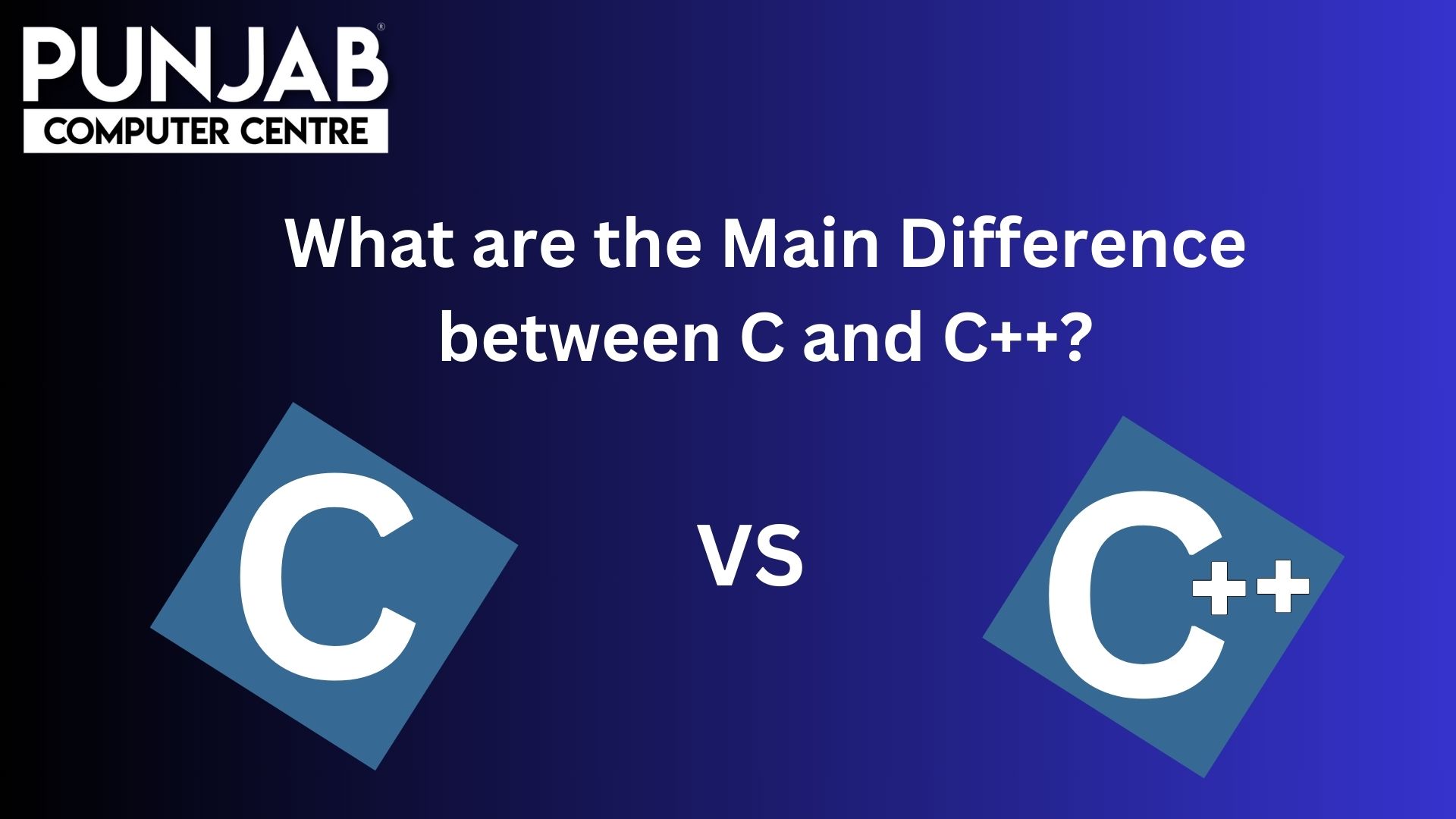Do you want to know the Difference between C and C++. C and C++ are both programming languages which are both used extensively with their own benefits and qualities. Although C is considered as a basic language, which many modern languages are derived from, C++ is C with other improvements incorporated to C, to make programming more flexible and easier.
For more information you can visit at Punjab Computer Center Scf 98, near Lakshya Institute, Chotti Baradari, Bagichi Het Ram, Patiala, Punjab 147001
Understand What are the Main Difference between C and C++?
1. Origin and Purpose
Originally C language evolved during 1970s by Dennis Ritchie while he was working at Bell labs. This language was intended to write system software including operation systems such as the UNIX. Another fact about C is that it is a procedural language design, so the main concept of the language is the functions or procedures to solve a problem.
On the other hand, C++ was conceived Bjarne Stroustrup in 1980s based on C language to extend it to support complex features to manage large programs effectively using object-oriented methodology. As in C, C++ comprehends all the basic instruments of this language; at the same time, new notions appeared, such as classes and objects, which allowed programming to be more organized and easier to control.
2. Programming Paradigm
One broadly distinguishes C and C++ based on the programming paradigm that these languages support.
C is Procedural:
Therefore, C is based on procedures or functions that have been called functions or procedures. He said ‘You type in functions, you feed it with data and it gives out the result.’ The focus is put on the flow of actions or steps that should be made to gain the desired outcome.
C++ is Both Procedural and Object-Oriented:
Compared to C, C++ lets you also employ procedural programming and comes with the concepts of object-oriented programming (OOP). OOP enables one to develop classes that group both data and functions into one entity. This makes real-world entities easier to model, more programs can be handled at once, and the usage of code reusability increases. For instance, you can develop a class “Car”, and there will be its attributes: color and model, actions: drive and stop. This makes C++ more scalable than Java because of the flexibility that comes with the modularity of C++.
3. Memory Management
In C, memory management is done manually using functions like malloc() and free(). Programmers need to allocate memory and free it when it’s no longer needed, which can sometimes lead to errors like memory leaks if not handled properly.
C++ introduces new ways of managing memory more easily. For example, C++ has operators like new and delete, which simplify the process of allocating and deallocating memory. Additionally, C++ supports smart pointers and other features that help manage memory automatically, reducing the chances of errors.
4. Data Security
The data security in C is not very effective when compared to that of the B and A languages. C allows to take and change the data from anywhere at any time in the program which is not good for large programs. For example, in C-programming language, global variables can be altered anywhere within the code translation path, this is not easy to track.
Data security in C++ is also improved by the use of classes, and encapsulation techniques. Encapsulation makes it possible to conceal the content of a class as well as limit the access possible for data. For instance, you can assign some class members to be private, thus not allowing anybody to access them from outside the class. This means that only the particular functions of the class can alter the data, and this brings more control and safety.
5. Code Reusability
C lacks features like inheritance and polymorphism, which are available in C++. In C, if you want to reuse code, you might need to copy and paste it or write additional functions. This can make your code lengthy and harder to maintain.
C++ allows for code reusability through inheritance. You can create a base class and extend its functionality in derived classes. For example, if you have a class “Vehicle,” you can create specific classes like “Car” and “Bike” that inherit properties and methods from the “Vehicle” class. This saves time and makes your code more efficient.
Conclusion
Concisely, C is a programming language suitable for system-level programs as well as for small projects or programs because of its fast execution time. C++, as an extension to C, has the base of C’s strengths and then added more robust features including Object-oriented programming, better control of memory, and better flexibility for large size and complicated applications. In starting programming, comprehension of both languages is beneficial. C is a good start while C++ gives an individual more features to develop complex programs.
Book your appointment for the C & C++ Course in Patiala today by calling +91 9988571313.







